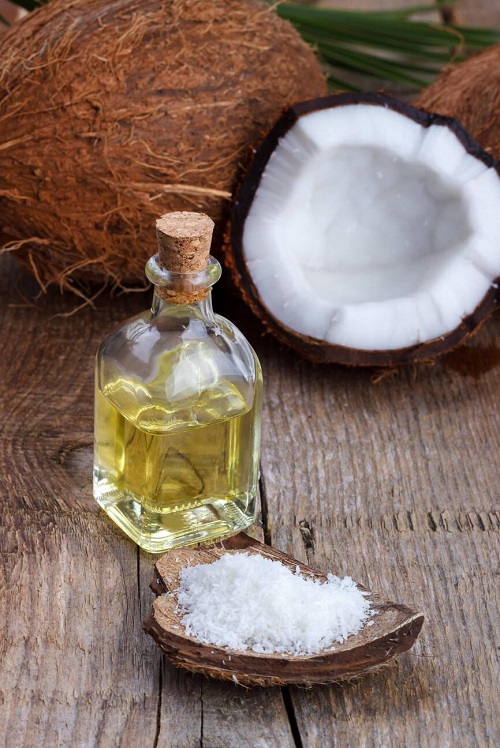Pamper yourself using a tropical treat with a Coconut Oil Bath and boost your mood and health like never before!
If you are looking for a natural and relaxing way to pamper yourself, you have come to the right place. In this guide, we’ll show you how to make and use a coconut oil bath and step into a state of well-being!
Can You Put Essential Oils In A Bath? Read On To Know More About iIs Therapeutic Properties Here
What Is Coconut Oil Bath?
Traditionally rooted in the ancient wisdom of Ayurveda and intertwined with practices like Ashtanga yoga, a coconut oil bath is a holistic ritual. It involves a generous application of warm coconut oil all over the body, often before a warm bath. This method is steeped in the philosophy of balancing and rejuvenating the body’s energies, especially after intense physical or mental exertion.
Transitioning to its contemporary interpretation, the concept of a coconut oil bath has evolved to suit modern lifestyles while still embracing its core essence of nourishment and relaxation.
In today’s context, it often means adding coconut oil to bathwater or applying it to the skin either before or after a soak. This simplified version focuses more on the practical aspects of skin hydration and the soothing, spa-like experience you can enjoy in the comfort of your home.
Explore The Key Benefits Of Coconut Oil And Coconut Oil Here
Coconut Oil Bath Vs Traditional Baths
The approach to skincare distinguishes a coconut oil bath from a typical bath with chemical-based soaps and body washes. While traditional bathing products frequently depend on harsh chemicals that can strip the skin of its natural oils, leaving it feeling dry, irritated, and susceptible to infections, a coconut bath adopts a gentler and more nourishing approach.
Abundant in fatty acids and antioxidants, coconut oil can hydrate, heal, and shield your skin from damage. A coconut bath can also soothe various skin conditions like eczema and psoriasis, as well as boost your immune system and mood.
Castor Oil Vs Coconut Oil For Hair! Which One Is Better? Find It Out Here!
Coconut Oil Bath Benefits
1. Moisturizes and Nourishes the Skin from Within
Coconut oil is an excellent natural moisturizer that can penetrate the skin quickly and lock in moisture, leaving your skin feeling soft and hydrated. It also contains fatty acids that nourish the skin’s texture, preventing dryness and flakiness.
Tip: Add a few drops of your favorite essential oil to the coconut oil for a relaxing and aromatic bath.
2. Soothes Itchiness
Got red, angry skin? Coconut oil steps in like a calm, soothing friend, thanks to its anti-inflammatory properties. It forms a protective barrier on the skin, preventing further damage and reducing the risk of infection and inflammation.
Tip: Apply some coconut oil directly to the affected areas before or after your bath for extra relief.
3. Helps Treat Skin Conditions like Eczema and Psoriasis
Rich in lauric acid and other medium-chain fatty acids (MCFAs), coconut oil is scientifically proven to be beneficial for skin conditions like eczema and psoriasis. These fatty acids deeply penetrate the skin barrier, offering relief from dryness.
Moreover, lauric acid’s antimicrobial properties help fight skin infections, while the polyphenols and Vitamin E in coconut oil provide anti-inflammatory benefits, reducing redness and irritation.
4. Improves Skin Elasticity and Promotes Anti-aging
Coconut oil is packed with powerful antioxidants that help ward off free radicals, stave off premature aging, and improve skin elasticity. It also helps to stimulate collagen production, which is essential for maintaining firm and youthful skin.
5. Relaxes Tensed Muscles
It provides a soothing and relaxing effect on the muscles, as it helps to ease tension, stiffness, and soreness. It also has anti-inflammatory properties that can reduce swelling and pain. Coconut oil can also enhance the effects of massage, as it lubricates the skin and allows for smoother strokes.
Tip: You can consider a coconut oil head massage for a better soothing effect.
6. Enhances Blood Circulation

This beneficial oil improves blood circulation by dilating the blood vessels and increasing blood flow to the skin and other organs. This can help to deliver more oxygen and nutrients to the cells, as well as remove toxins and waste products.
Improved blood circulation can also boost energy levels, metabolism, and overall health.
7. Reduces Stress
Coconut oil can help to lower stress levels by stimulating the production of serotonin, a neurotransmitter that regulates mood, sleep, and appetite. Serotonin can also counteract the effects of cortisol, a stress hormone that can cause anxiety, depression, and inflammation.
It can also promote relaxation and calmness by activating the parasympathetic nervous system, which is responsible for rest and digestion.
8. Boosts Immunity
In Ayurveda, coconut oil baths are considered more than just skincare; they’re seen as a way to boost immunity. Applied to the skin, coconut oil deeply nourishes and rejuvenates at a cellular level, bolstering the body’s natural defenses. Its lauric acid content forms a barrier against environmental pathogens.
Additionally, the bath’s soothing effect on the mind and body contributes to overall well-being, which is crucial for a strong immune system. Regular coconut oil baths, therefore, are a holistic practice for enhancing immunity in Ayurvedic tradition.
Learn the Benefits Of Using Castor Oil For Muscle Knots Here
How To Make Coconut Oil Bath?
Precautions to Consider
- Check for allergies before using coconut oil on your skin. Do a patch test or consult your doctor if you have a history of tree nut allergies.
- Use the right type of coconut oil for your bath. Choose organic, unrefined, cold-pressed, or virgin coconut oil, as they have the most beneficial properties and nutrients.
- Be careful with the temperature of the water and the oil. Use warm water, not hot, as hot water can dry out your skin. Heat the coconut oil gently until it melts, but do not overheat it, as it can lose some of its benefits.
- Avoid using coconut oil if you have oily or acne-prone skin. Coconut oil can clog your pores and cause breakouts, especially on your face. Use a lighter oil like jojoba or almond oil instead.
- Rinse off your skin after the bath and pat it dry. Coconut oil can make the tub slippery, so be careful when stepping out.
- Once you’re done with your bath, also rinse out your bathtub to remove any residue of castor oil. This prevents slippery surfaces and ensures your next bath is clean and refreshing.




